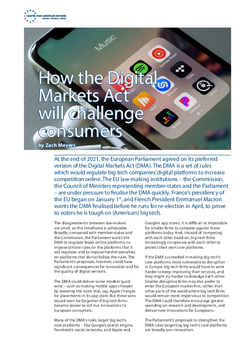
How the Digital Markets Act will challenge consumers
The European Parliament’s proposals to tame big tech will challenge consumers. Some of these proposals will promote innovation – but law-makers should drop proposals which will stifle it.
At the end of 2021, the European Parliament agreed on its preferred version of the Digital Markets Act (DMA). The DMA is a set of rules which would regulate big tech companies’ digital platforms to increase competition online. The EU law-making institutions – the Commission, the Council of Ministers representing member-states and the Parliament – are under pressure to finalise the DMA quickly. France’s presidency of the EU began on January 1st, and French President Emmanuel Macron wants the DMA finalised before he runs for re-election in April, to prove to voters he is tough on (American) big tech.
The disagreements between law-makers are small, so this timeframe is achievable. Broadly, compared with member-states and the Commission, the Parliament wants the DMA to regulate fewer online platforms; to impose stricter rules on the platforms that it will regulate; and to impose harsher penalties on platforms that do not follow the rules. The Parliament’s proposals, however, could have significant consequences for innovation and for the quality of digital services.
Parliament’s proposals to strengthen the DMA rules targetting big tech’s core platforms are broadly pro-innovation.
The DMA could deliver some modest ‘quick wins’ – such as making mobile apps cheaper by lowering the costs that, say, Apple charges for placements in its app store. But these wins would soon be forgotten if big tech firms became slower to roll out innovations to European consumers.
Many of the DMA’s rules target big tech’s core platforms – like Google’s search engine, Facebook’s social networks, and Apple and Google’s app stores. It is difficult or impossible for smaller firms to compete against these platforms today. And, instead of competing with each other head-on, big tech firms increasingly co-operate with each other to protect their own core platforms.
If the DMA succeeded in making big tech’s core platforms more vulnerable to disruption in Europe, big tech firms would have to work harder to keep improving their services, and they might try harder to dislodge each other. Smaller disruptive firms may also prefer to enter the European market first, rather than other parts of the world where big tech firms would remain more impervious to competition. The DMA could therefore encourage greater spending on research and development, and deliver new innovations for Europeans.
The Parliament’s proposals to strengthen the DMA rules targetting big tech’s core platforms are broadly pro-innovation. As one example, MEPs want to force big social media platforms to be ‘interoperable’. This means consumers could swap Facebook for a competing social media app, while still being able to interact with their friends who stay on Facebook. Interoperability would make it easier for Facebook’s users to leave. If the interoperability rules are properly designed and implemented, this would make it easier for competitors to Facebook to succeed – and should give Facebook incentives to build new features to attract and keep consumers.
But some of the Parliament’s other proposals would have more ambiguous effects on innovation in Europe. For example, the Parliament wants more of the DMA’s rules to apply to big tech firms’ dominant services – which are not part of their entrenched core platforms. In some cases, the rules are justified because they would allow new forms of competition. For example, the DMA would open up the iPhone’s payments technology, allowing competitors to Apple Pay to be used on iPhones. But in other cases, the DMA rules – even without Parliament’s proposed changes – would simply constrain how big tech firms can develop and promote new services. Parliament wants to extend these rules even further.
For example, when a consumer first uses a smartphone with Google’s Android operating system, MEPs want the consumer to choose from a range of options for each type of app – such as their preferred web browser – rather than being able to start using their phone right away with the pre-installed apps. This proposal could affect innovation incentives for tech firms. For example, Google has developed its Android operating system and gives it away to phone manufacturers for free, making it more likely that consumers will try out Google’s other pre-installed services. If MEPs had their way, Android might no longer serve this purpose for Google, so Google might start charging manufacturers to use it. That might mean it becomes profitable for developers to create new operating systems, generating more competition – but it might also simply drive up the cost of smartphones and discourage Google from investing in Android’s development. Getting the balance right is tricky.
When it comes to the quality of digital services, the DMA involves similarly difficult choices. The DMA will make big tech’s services worse in certain ways, to allow for more competition and more choice. As examples, big tech firms will be less able to offer personalised services; their services will not work together as seamlessly as they do today; and consumers could face more ‘cookie banner’-style requests for consent.
Some of this pain is necessary so consumers are prompted to shop around, rather than remaining in the cosy ecosystem of services of a single firm. Many of these nuisances should also resolve themselves in the long run, once big tech firms resign themselves to the reality of the DMA. For example, big tech firms might choose to process less personal data so consumers are not bombarded with consent requests. The DMA is therefore a case of ‘no pain, no gain’ for consumers. Law-makers should not undermine the DMA by trying to eliminate every consumer inconvenience – otherwise, they will jettison some of its long-term benefits. However, law-makers should also ensure any pain is not so sudden and severe that European consumers hate the DMA.
Law-makers need to give the Commission more discretion about how big tech firms comply with the DMA rules.
Law-makers therefore need to give the Commission more discretion about how big tech firms comply with the DMA rules. The DMA currently allows some exceptions from the rules. But these exceptions are too narrow to be of much use. The exceptions also allow a big tech firm to decide for itself when they should apply – which could allow firms to undermine the DMA’s objectives. Instead, firms should be required to seek the Commission’s agreement when they believe a DMA rule would cause unjustified harm to consumers, so the firm and the Commission can agree on alternative ways to meet the DMA’s objectives.
If the final form of the DMA is negotiated by March, then Macron will be able to tout it as an achievement, well before voters are faced with the DMA’s effects. However, the EU will have to live with the DMA for years to come. Law-makers therefore need to consider MEPs’ proposed amendments carefully. The DMA will inevitably be somewhat of a crude instrument – and the final negotiations between law-makers will not change that. But if it is targeted in scope, the DMA will still achieve more good than harm. If it is not, European innovation could slow – and European consumers could end up bitterly disappointed.
Zach Meyers is a senior research fellow, Centre for European Reform
A number of technology companies including Amazon, Apple and Facebook are corporate members of the CER. The views expressed here, however, are solely the author’s, and should not be taken to represent the views of those companies.
To read more on this subject see Zach's recent CER policy brief 'No pain, no gain? The Digital Markets Act'.

